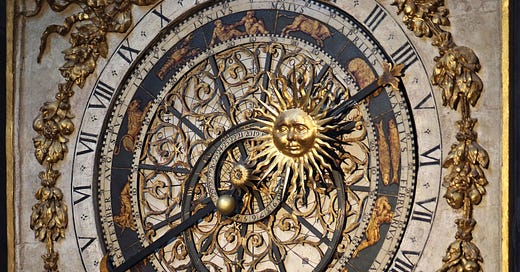Most churches recognise the main feasts of the Christian Calendar; Christmas, Easter and Pentecost. Some go further and commemorate saints days, Epiphany and Lent.
The more Modernist Churches only celebrate Easter Sunday and Christmas, without even having any consideration of the Advent period.
In their experience of being a member of a Modernist community of faith, they are disconnected from the rich tradition of the liturgical year.
The Importance of the Liturgical Year
The liturgical calendar is the way of connecting the seasons of the year and the procession of the church story through the months. It connects the metaphysical with the physical.
This calendar comes from how the Israelites and Jews experienced the year. By missing out on this, the Modernist churches are cutting themselves off from the ancient Biblical culture.
These liturgical feasts create an environment where the church comes together, not just locally, but nationally and internationally. These moments of fasting and feasting build stronger bond within and between church communities.
Fasting Over Feasting
In the traditional church, there can be a significant focus on fasting. Either through the ‘Little Lent’ leading up until Christmas and the ‘Great Lent’, leading up to Eastertide.
The issue here is the traditional church can focus too much on the fast and not enough on the feast.
In the early Church, there were many groups which denied the body, through fasting, flagellation and other methods. But they rarely feasted.
Today, we have similar groups. There is no feasting in the Climate Crisis movement, the various feminist groups or within other similar activist groups. It’s all about grievances, rather than joy. It’s about activism, rather than having any celebration.
By feasting, I don’t just meaning sharing a meal together, but intentionally spending time worshipping God and living out a life within the community of love and joy.
Modern Secular Feasts
Human societies live within cycles. Daily, weekly, monthly and yearly ones. Certain days are used to mark particular moments in the cycle.
Traditionally, these days represented an event in the Bible, or were dedicated to remembering a saint. The Modern Secular West have continued to use this idea, but replaced the holy and saints days with new ones. National days, Earth Day, Pride Month, both International Womens’ day and International Mens’ Day. They also include Black Friday, Black History Month and even Pi (3.14) Day.
Within some parts of the church, they have adopted these events, over the saints days which appear at the same time.
These secular feast days try to bring the society together around a similar activity or cultural idea. However, these feasts are not celebrations of the hope we have in Christ, but are materialistic and temporal in focus. They take our eyes off God, and bring them down into the physical realm. They are earthbound, not heavenly focussed.
Full strength Christianity should not only be about spiritual and physical discipline, but about feasting too. Not by overeating or indulging the fleshly passions, but through celebrating God and taking great joy in what He has provided. Remembering those events that are instrumental to our faith, but also the saints whose lives help build the Church.





Excellent piece. Musn't forget that God invented fun.
Hear,hear!